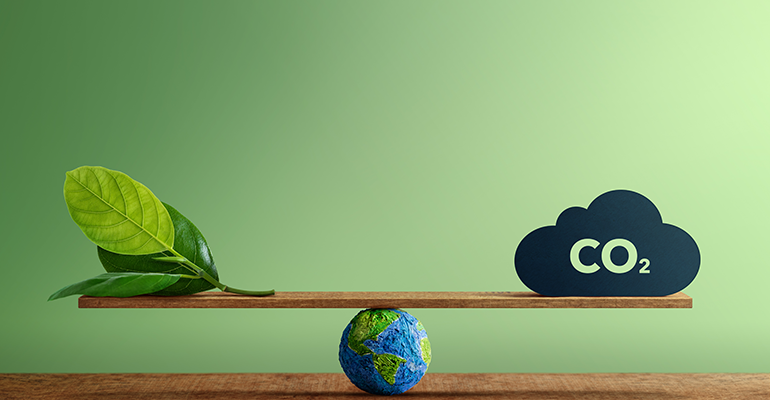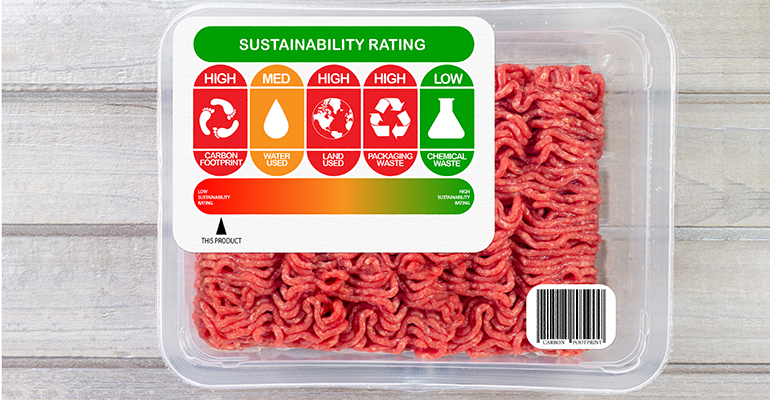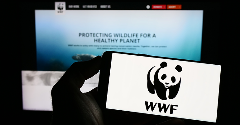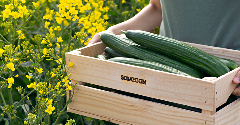News
Calls grow for a ban on climate-neutral food claims
29 Mar 2023
Food and drink claims on climate neutrality are scientifically impossible, misleading, and must be banned, says the European Consumer Organisation (BEUC).
Misleading claims relating to carbon neutrality are prevalent in today’s food and drink landscape, prompting confusion and a lack of trust among consumers, European consumer group, BEUC, has found. In its new report, A Climate-Neutral Food Basket: Too Good To Be True, BEUC released a snapshot of examples of where this is the case by consumer groups from ten countries.

In response, BEUC is urging the EU to ban the use of carbon-neutral claims for all products, including food and drink. Both the European Commission and Parliament are expected to tackle greenwashing imminently, with the release of its Green Claims Initiative proposal on 22nd March 2023.
Increase in court cases for misleading greenwashing claims
As consumer interest and concern about the environmental impact of their dietary habits increases, so too have the number of products bearing misleading ‘carbon neutral’ claims, says Calvert. “It is, therefore, very easy to spot these kinds of claims on supermarket shelves today,” says Emma Calvert, senior food policy officer at BEUC.
Greenwashing has a widespread impact on the food and drink industry. In a sea of green claims, genuinely impactful ones can be drowned out. “Stakeholders who have committed to seriously reducing their emissions and others who rely on buying up cheap carbon credits to cover business-as-usual are using similar claims,” says Calvert.
BEUC recognises that there has been an increasing number of court cases brought against companies using these misleading claims, which can lead to clear reputational risks and legal repercussions.
Some claims are ‘scientifically impossible’, says BEUC
A wide variety of food products in Europe now feature claims relating to sustainable action, including ‘carbon neutral’, ‘CO2 neutral’, ‘carbon positive’, and ‘carbon neutral certified’. Current European rules prevent authorities or courts from reprimanding manufacturers from brandishing these until they cause damage and can prove consumers have been misled.
“Consumers should, in the first place, not be exposed to such deceptive practices,” the BEUC says, calling for a total ban on carbon-neutral claims. The organisation’s basis for this ban is based on five key points, primarily that these are scientifically inaccurate as producing food and drinks will always necessitate carbon emissions.
Carbon-neutral claims are misleading for consumers, giving them the erroneous impression that products labelled as such are good for the planet and that no carbon has been emitted in their production process. Claims of this nature are “scientifically impossible”, says Calvert.
The umbrella group for 46 independent consumer organisations from 32 countries, BEUC, states that its German member, for example, found only 8% of consumers could objectively identify that carbon-neutral claims do not mean no greenhouse gases were emitted during production.
“Carbon neutrality only makes sense on the planetary level,” says Calvert. “From the point of scientific accuracy, no individual product can be described as ‘carbon neutral’ because their production will always necessitate carbon emissions.”
 © AdobeStock/HollyHarry
© AdobeStock/HollyHarry
Misleading consumers on climate change
Carbon offsetting, which underpins most carbon neutral claims, provides no guarantees for ‘locking in’ carbon for the future.These claims mislead consumers, giving the false impression that products are a climate-conscious choice.
Carbon offsetting is the practice that underpins most food companies’ carbon-neutral claims. Most consumers are unaware of this, which lacks any guarantees of permanence.
Implementing carbon offsetting within businesses enables them to pay, often at low prices, for carbon credits – a carbon credit represents one tonne of compensated carbon emissions – from offsetting certain projects. Carbon offsetting sees companies ‘balance out’ their carbon-emitting operations to claim carbon neutrality.
Carbon compensation schemes typically lean on tree-planting projects in developing countries that subsequently create definite and long-term credits. However, the reality of nature-related offsetting projects achieving a compensatory effect is not a certainty.
For example, pledging to plant trees today does not guarantee their permanence in the future. Drought, logging, and fires are examples of real threats to forestry projects which risk releasing any carbon temporarily sequestered, according to Calvert.
Recommendations for eradicating greenwashing
Carbon-neutral claims can obscure consumers’ previously held correct judgements on food products’ climate impact. For example, in BEUC’s report, without any climate labels, 70% of consumers could correctly classify three food products – a vegan burger patty, a pork schnitzel and a beef rump steak – according to their greenhouse gas emissions. The beef was the most carbon-intensive, and the vegan patty the least.
However, as soon as a ‘climate neutral’ claim is placed on the products, consumer confusion ensues. The percentage of consumers correctly rating the particular products dropped by over half to just 31%, with over a quarter believing that beef steak is the most climate-friendly food.
Promoting the idea that climate change can be tackled without serious and direct reductions of carbon emissions is not only misleading for consumers, but Calvert says it is “also irresponsible in the context of the climate crisis and the corresponding need to undertake urgent and systemic changes to our food consumption patterns”.
“We are therefore calling for carbon-neutral claims to be banned on all products, including food and beverages.”
Related news

Soy story: WWF scores UK supermarkets on sustainability efforts
12 Nov 2025
WWF has published its latest “Soy Scorecard”, ranking UK supermarkets’ efforts to combat deforestation and land conversion in their soy supply chains.
Read more
Standing Ovation and Bel scale up casein production from dairy co-products
11 Nov 2025
Foodtech company Standing Ovation has partnered with cheese specialist Bel Group to manufacture dairy serums for industrial-scale casein production via precision fermentation.
Read more
New UPF standard hoped to offer consumers ‘coherence and clarity’
10 Nov 2025
Ingredients companies are being urged to enter “a new era of partnership and innovation” following the launch of the industry’s first non-UPF verification scheme.
Read more
Whistleblowers accuse UK meat industry of promoting cheap, unsustainable supply
7 Nov 2025
An anonymous group of industry insiders has accused the UK’s biggest food companies of systematically driving down meat quality and welfare standards.
Read more
Bord Bia presents Irish dairy ingredient suppliers at Fi Europe
6 Nov 2025
Dairygold Co-operative Society, The Carbery Group, and Ornua Co-operative: Meet with sustainable producers of Irish dairy ingredients at Food ingredients Europe 2025, Hall 7.2 Stand M18.
Read more
AI attraction means foodtech startups must ‘prove’ rather than ‘promise’
4 Nov 2025
Reports suggest that artificial intelligence (AI) is sucking investment from foodtech and agritech, but investors say the picture is complicated.
Read more
Penguin and Club bars no longer classed as chocolate
30 Oct 2025
Penguin and Club bars can no longer be classified as chocolate after the pladis-owned McVitie’s brands turned to cheaper alternatives amid the ongoing cocoa crisis.
Read more
Could plant-based protection replace plastic packaging?
29 Oct 2025
Swedish foodtech company Saveggy has launched an additive-free plant-based protection for cucumbers, offering a waste-free packaging solution for fruit and vegetables.
Read more
Does promoting protein content push up plant-based sales?
27 Oct 2025
Promoting the protein content of meat-free products is a more effective sales strategy than adding carbon labels, a study of UK bakery chain Greggs suggests.
Read more
Amazon Grocery launch aims to balance quality with affordability
22 Oct 2025
Global e-commerce giant Amazon has introduced a new private-label food brand, combining existing Amazon Fresh and Happy Belly products with new everyday items.
Read more